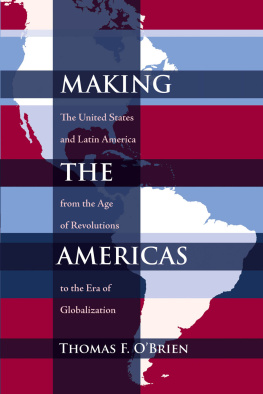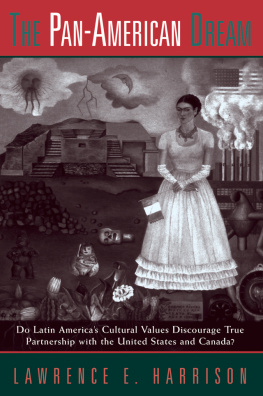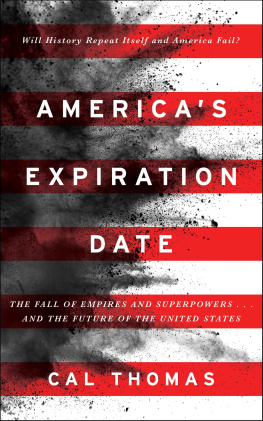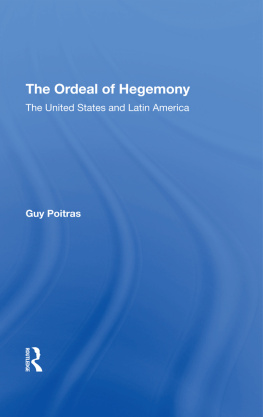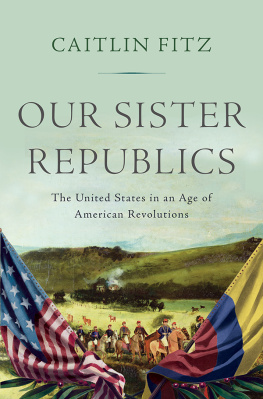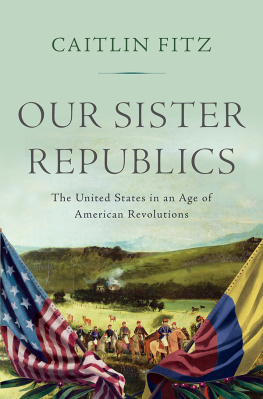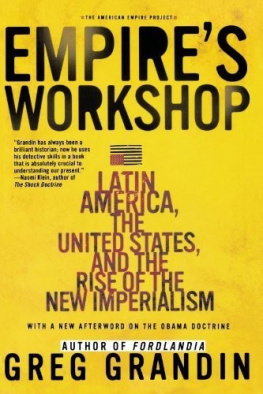MAKING THE AMERICAS
Dilogos Series
Kris Lane, Series Editor
Understanding Latin America demands dialogue, deep exploration, and frank discussion of key topics. Founded by Lyman L. Johnson in 1992 and edited since 2013 by Kris Lane, the Dilogos Series focuses on innovative scholarship in Latin American history and related fields. The series, the most successful of its type, includes specialist works accessible to a wide readership and a variety of thematic titles, all ideally suited for classroom adoption by university and college teachers.
For additional titles in the Dilogos Series, please visit unmpress.com .
ISBN for this digital edition: 978-0-8263-4201-0
2007 by the University of New Mexico Press
All rights reserved. Published 2007
PRINTED IN THE UNITED STATES OF AMERICA
12 11 10 09 08 07 1 2 3 4 5 6
The Library of Congress has cataloged the printed edition as follows:
OBrien, Thomas F., 1947
Making the Americas : the United States and
Latin America from the age of revolutions to the era of globalization /
Thomas F. OBrien.
p. cm.
Includes bibliographical references and index.
ISBN 978-0-8263-4200-3 (pbk. : alk. paper)
1. Latin AmericaCivilizationAmerican influences.
2. Latin AmericaHistory.
3. Latin AmericaRelationsUnited States.
4. United StatesRelationsLatin America. I. Title.
F1408.3.O27 2007
980dc22
2007004234
Book and cover design and typography by Kathleen Sparkes
INTRODUCTION

FOR MORE THAN HALF A CENTURY, THE UNITED STATES HAS BEEN leading a worldwide process of transformation that has profoundly influenced the lives of people around the globe. This American mission of globalization, which stresses economies open to U.S. trade and investment, republican political institutions, individualism, competitiveness, and consumerism, has in fact been shaped by a centuries-long project of transformation in Latin America. Furthermore, the responses of Latin Americans to the American initiatives, including embracing consumer goods, reconfiguring the meaning of such products to accommodate the needs of local cultures, as well as rejecting some of the economic and political aspects of the American project in popular protests and revolutionary upheavals, prefigured many of the reactions of other cultures to the process of globalization. Yet just as these hemispheric interactions were taking on their greatest global significance, the academicians most concerned with their study seemed trapped by theoretical sterility and mired in circular debates.

In 1992 historian Michael Hunt summarized the condition of diplomatic history this way:
Our remarkably sustained exercise in self-reflection and self criticism over the last two decades was a defensive response
Hunts words succinctly captured the crisis in the study of international relations during the closing decades of the twentieth century. The field had been passed by in a profession newly empowered by approaches such as cultural and social history and by focusing on issues of gender and race. Despite the crisis that he described, Hunt concluded that this travail had in fact renewed the discipline. Hunts conclusion was quite accurate, for even as he wrote, other scholars, many of them not trained strictly as diplomatic historians, were bringing fresh new approaches to the issues of international relations.

As early as 1982, Emily Rosenbergs Spreading the American Dream explored not only the economic but also the cultural aspects of U.S. expansionism. Although much of Rosenbergs work focused on the role of the state, she also gave considerable attention to the effects of corporate activity in areas such as communication and transportation, as well as the initiatives of groups such as philanthropists and missionaries. William Roseberrys Anthropologies and Histories further expanded the analytical approaches to international relations in a set of provocative essays that explored topics ranging from anthropological debates about culture to dependency theory. One of those essays addresses the concept Roseberrys work marked the increasing influence of anthropological theories and approaches employed by historians, especially in the analysis of culture as a force in history. At the same time, examinations of race and gender, as well as subaltern studies, were taking on a growing significance in the history profession. The rich array of new analytical perspectives, which themselves were the source of much of the criticism of diplomatic history, were soon being applied by scholars to the history of international relations, especially in the Americas.
My own work, Revolutionary Mission, inspired in part by Rosenberg and Roseberry, examined the role of American business in Latin America. Rather than focusing on issues such as theories of the corporation or the specific effects of U.S. investments on economic development, the book examines the attempts of corporate executives and managers to transform their Latin American workforces, disciplining their employees to the rigors of wage labor and modern industrial work methods, encouraging American values such as individualism and competitiveness, and promoting consumerism as a lure into the world of full-time wage labor. At the same time, the work examines various forms of resistance by Latin Americans to the American agenda, culminating with the rise of populist, nationalist political movements in the 1920s and 30s that challenged the project of transformation pursued by corporate America with the endorsement of Latin American elites. The book offered one alternative to the focus on state interactions that had dominated the study of inter-American relations throughout the decades, but it was one of only several such new approaches that scholars were already generating in the 1980s. Much like my own analysis of corporatist agents of Americanization, Marcus Cuetos edited volume,

